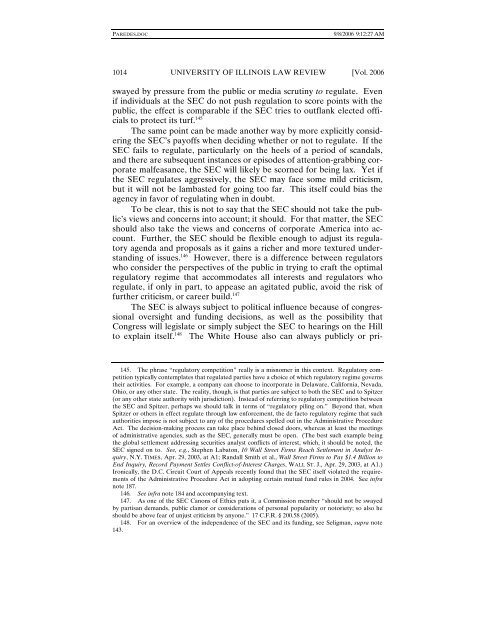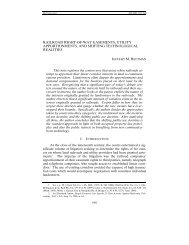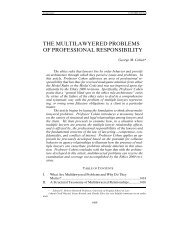on the decision to regulate hedge funds - University of Illinois Law ...
on the decision to regulate hedge funds - University of Illinois Law ...
on the decision to regulate hedge funds - University of Illinois Law ...
Create successful ePaper yourself
Turn your PDF publications into a flip-book with our unique Google optimized e-Paper software.
PAREDES.DOC<br />
9/8/2006 9:12:27 AM<br />
1014 UNIVERSITY OF ILLINOIS LAW REVIEW [Vol. 2006<br />
swayed by pressure from <strong>the</strong> public or media scrutiny <strong>to</strong> <strong>regulate</strong>. Even<br />
if individuals at <strong>the</strong> SEC do not push regulati<strong>on</strong> <strong>to</strong> score points with <strong>the</strong><br />
public, <strong>the</strong> effect is comparable if <strong>the</strong> SEC tries <strong>to</strong> outflank elected <strong>of</strong>ficials<br />
<strong>to</strong> protect its turf. 145<br />
The same point can be made ano<strong>the</strong>r way by more explicitly c<strong>on</strong>sidering<br />
<strong>the</strong> SEC’s pay<strong>of</strong>fs when deciding whe<strong>the</strong>r or not <strong>to</strong> <strong>regulate</strong>. If <strong>the</strong><br />
SEC fails <strong>to</strong> <strong>regulate</strong>, particularly <strong>on</strong> <strong>the</strong> heels <strong>of</strong> a period <strong>of</strong> scandals,<br />
and <strong>the</strong>re are subsequent instances or episodes <strong>of</strong> attenti<strong>on</strong>-grabbing corporate<br />
malfeasance, <strong>the</strong> SEC will likely be scorned for being lax. Yet if<br />
<strong>the</strong> SEC <strong>regulate</strong>s aggressively, <strong>the</strong> SEC may face some mild criticism,<br />
but it will not be lambasted for going <strong>to</strong>o far. This itself could bias <strong>the</strong><br />
agency in favor <strong>of</strong> regulating when in doubt.<br />
To be clear, this is not <strong>to</strong> say that <strong>the</strong> SEC should not take <strong>the</strong> public’s<br />
views and c<strong>on</strong>cerns in<strong>to</strong> account; it should. For that matter, <strong>the</strong> SEC<br />
should also take <strong>the</strong> views and c<strong>on</strong>cerns <strong>of</strong> corporate America in<strong>to</strong> account.<br />
Fur<strong>the</strong>r, <strong>the</strong> SEC should be flexible enough <strong>to</strong> adjust its regula<strong>to</strong>ry<br />
agenda and proposals as it gains a richer and more textured understanding<br />
<strong>of</strong> issues. 146 However, <strong>the</strong>re is a difference between regula<strong>to</strong>rs<br />
who c<strong>on</strong>sider <strong>the</strong> perspectives <strong>of</strong> <strong>the</strong> public in trying <strong>to</strong> craft <strong>the</strong> optimal<br />
regula<strong>to</strong>ry regime that accommodates all interests and regula<strong>to</strong>rs who<br />
<strong>regulate</strong>, if <strong>on</strong>ly in part, <strong>to</strong> appease an agitated public, avoid <strong>the</strong> risk <strong>of</strong><br />
fur<strong>the</strong>r criticism, or career build. 147<br />
The SEC is always subject <strong>to</strong> political influence because <strong>of</strong> c<strong>on</strong>gressi<strong>on</strong>al<br />
oversight and funding decisi<strong>on</strong>s, as well as <strong>the</strong> possibility that<br />
C<strong>on</strong>gress will legislate or simply subject <strong>the</strong> SEC <strong>to</strong> hearings <strong>on</strong> <strong>the</strong> Hill<br />
<strong>to</strong> explain itself. 148 The White House also can always publicly or pri-<br />
145. The phrase “regula<strong>to</strong>ry competiti<strong>on</strong>” really is a misnomer in this c<strong>on</strong>text. Regula<strong>to</strong>ry competiti<strong>on</strong><br />
typically c<strong>on</strong>templates that <strong>regulate</strong>d parties have a choice <strong>of</strong> which regula<strong>to</strong>ry regime governs<br />
<strong>the</strong>ir activities. For example, a company can choose <strong>to</strong> incorporate in Delaware, California, Nevada,<br />
Ohio, or any o<strong>the</strong>r state. The reality, though, is that parties are subject <strong>to</strong> both <strong>the</strong> SEC and <strong>to</strong> Spitzer<br />
(or any o<strong>the</strong>r state authority with jurisdicti<strong>on</strong>). Instead <strong>of</strong> referring <strong>to</strong> regula<strong>to</strong>ry competiti<strong>on</strong> between<br />
<strong>the</strong> SEC and Spitzer, perhaps we should talk in terms <strong>of</strong> “regula<strong>to</strong>ry piling <strong>on</strong>.” Bey<strong>on</strong>d that, when<br />
Spitzer or o<strong>the</strong>rs in effect <strong>regulate</strong> through law enforcement, <strong>the</strong> de fac<strong>to</strong> regula<strong>to</strong>ry regime that such<br />
authorities impose is not subject <strong>to</strong> any <strong>of</strong> <strong>the</strong> procedures spelled out in <strong>the</strong> Administrative Procedure<br />
Act. The decisi<strong>on</strong>-making process can take place behind closed doors, whereas at least <strong>the</strong> meetings<br />
<strong>of</strong> administrative agencies, such as <strong>the</strong> SEC, generally must be open. (The best such example being<br />
<strong>the</strong> global settlement addressing securities analyst c<strong>on</strong>flicts <strong>of</strong> interest, which, it should be noted, <strong>the</strong><br />
SEC signed <strong>on</strong> <strong>to</strong>. See, e.g., Stephen Labat<strong>on</strong>, 10 Wall Street Firms Reach Settlement in Analyst Inquiry,<br />
N.Y. TIMES, Apr. 29, 2003, at A1; Randall Smith et al., Wall Street Firms <strong>to</strong> Pay $1.4 Billi<strong>on</strong> <strong>to</strong><br />
End Inquiry, Record Payment Settles C<strong>on</strong>flict-<strong>of</strong>-Interest Charges, WALL ST. J., Apr. 29, 2003, at A1.)<br />
Ir<strong>on</strong>ically, <strong>the</strong> D.C. Circuit Court <strong>of</strong> Appeals recently found that <strong>the</strong> SEC itself violated <strong>the</strong> requirements<br />
<strong>of</strong> <strong>the</strong> Administrative Procedure Act in adopting certain mutual fund rules in 2004. See infra<br />
note 187.<br />
146. See infra note 184 and accompanying text.<br />
147. As <strong>on</strong>e <strong>of</strong> <strong>the</strong> SEC Can<strong>on</strong>s <strong>of</strong> Ethics puts it, a Commissi<strong>on</strong> member “should not be swayed<br />
by partisan demands, public clamor or c<strong>on</strong>siderati<strong>on</strong>s <strong>of</strong> pers<strong>on</strong>al popularity or no<strong>to</strong>riety; so also he<br />
should be above fear <strong>of</strong> unjust criticism by any<strong>on</strong>e.” 17 C.F.R. § 200.58 (2005).<br />
148. For an overview <strong>of</strong> <strong>the</strong> independence <strong>of</strong> <strong>the</strong> SEC and its funding, see Seligman, supra note<br />
143.




